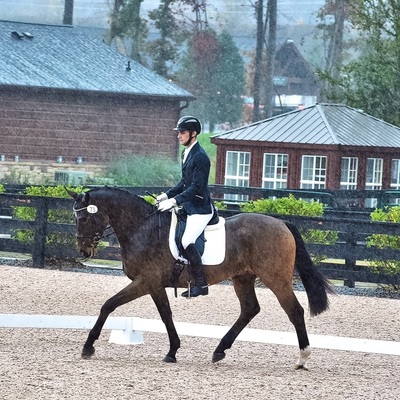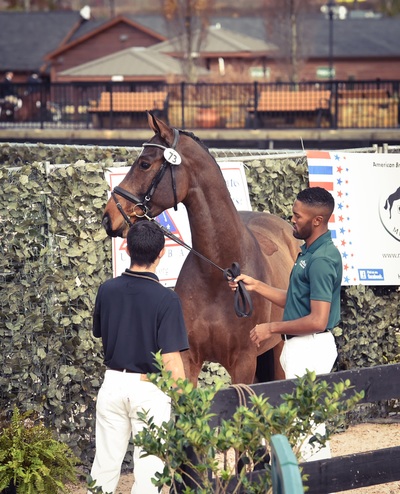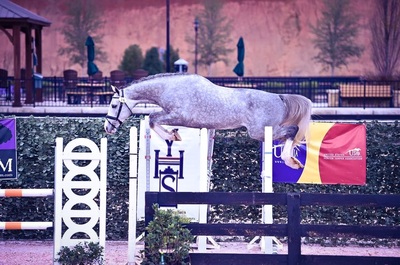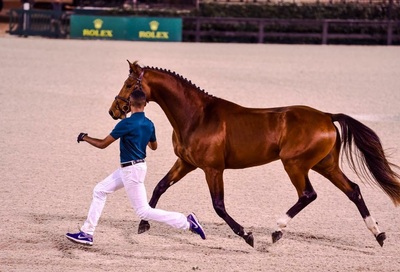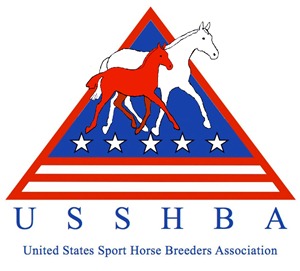|
The Young Horse Show Series, a program committed to the development of young sport horses within the United States, celebrated its fifth anniversary season last weekend at the Tryon International Equestrian Center. Against a backdrop of the Blue Ridge Mountain Range in Mill Spring, NC, the open layout of the Tryon show grounds lends itself well to showcasing a number of top quality sport horses both in-hand and under saddle. In direction relation to the promotion of these young horses, the show itself offers a variety of educational opportunities for handlers, owners, and spectators alike. I hold a firm belief that both continued education and the dissemination of my own knowledge sits at the core of my foundation as a professional handler. The in-hand portion of the show is comprised of two separate components, and while each requires a different systematic approach, the basic concept of teamwork plays a pivotal role in keeping the program running like a well-oiled machine. Akin to USEF/USDF breed shows, each horse is set up in front of the judge and presented in movement on the triangle. As official handlers for the program, we aid each other to insure every horse is presented to their maximum potential. Each horse that enters the ring is an individual, and as such, a revamp of handling methods may be required from one to the next. An electric, sensitive horse that over responds to the environment may need a few reassuring pats on the neck or some encouraging “good boys!”, while one that lacks the self-motivation to truly show themselves off may need a bit of support via a driving aid such as a lunge whip. As I am handed the reins to take a new horse into the ring, I connect with the owner for an insider’s perspective on how the horse may respond to the new environment. Each horse can change within the ring, and the key is to remain a few figurative steps in front of the horse, and to keep an open line of communication with fellow handlers. A vital element in the relationship I build with my clients is the ability to engage realistically about their horses’ strengths and weaknesses. I often find a disconnect between my work with a client’s horse and being able to critique how that individual horse may look for a judge or public audience. In contrast to the USEF/USDF breed shows, the Young Horse Show Series implements free running as the second component for the in hand class. For me as handler, being able to see the horse move freely paints a more complete picture of the “ins and outs” for each animal I work with. How do they use their hind end? Their front end? Do they travel correctly? Does the horse truly move through their body? Is the horse more balanced to one direction in comparison to the other? Being able to answer these questions can greatly influence the way I work with each horse, and in addition, my feedback for the owners. Many of my clients will ask for some exercises to practice with their horse once back at home, and it is crucial that we are able to collaborate to help each horse progress in the future. In addition to in-hand classes, the series also offers age-specific jump chute classes. I found the score cards for the jump chute particularly in depth, with critique given on take-off, front end technique, hind end technique, scope, and bascule. These classes give owners a thorough analysis of their horses, and the jumping quality of some of the entries is truly top notch. I do think the series provides a good niche for the young jumper market, and as such, the market has embraced it. My background as a handler is strongly dressage oriented but I find working with the jumper-bred horses helps to reshape some of my own philosophies - and its fun! The series is a unique opportunity to further understand equine athleticism across a broad spectrum of disciplines at various stages of development. Friday and Saturday nights featured exhibitor dinners, sponsored by Aliboo Farm, Inc. and the USEF/USHJA groups respectively. In conjunction with the USEF/USHJA dinner, spectators were treated to a Stallion and Mare Show. It was a treat as each horse commanded the George Morris Arena under the lights, and the presentations included live commentary on the horse's bloodlines and competition results. AliBoo set up a breeding survey raffle for exhibitors that included an iPad and gift cards as prizes. Everyone enjoyed the opportunity to network over good food and drink while refreshing our brains on some fun horse knowledge. I would really love to the see the Series find a bit more support from the Dressage community in particular and think it is vital for all of our separate markets here in the US that we work together and promote one another. The Finals in Tryon was a perfect juncture for motivated amateurs and professionals alike. A vast array of individuals inspired me throughout the weekend, including Taylor Flury and Jordan Bali of AliBoo Farm in Minooka, Illinois. In September, Taylor competed two of her own American-developed horses at the FEI World Breeding Jumping Championships for Young Horses in Belgium. She is a passionate cheerleader for the American sport horse and offered some insight as to how the US can improve our development of young horses, reflecting on her experiences showing in Europe. Taylor’s younger brother, Jordan, is an aspiring handler and assisted with the in-hand and jumpchute classes throughout the weekend. The industry is hurting for some new blood in the way of handlers, and I think Jordan is the type of individual we so desperately need: self-motivated with a strong capacity for learning and implementing new techniques. Self-motivation and an interest in education are two facets that the American sport horse community really needs to find a way to harness and support amongst its newest generation. The Young Horse Show Series is a perfect venue for doing so, illustrating a strong push for the development of both young horses and young professionals. The program consistently gives me new ways to network and refine my own skills while operating under a fun, laid back atmosphere. I hope to see the influence carry on into other parts of the industry! The number of horses qualifying for the series finals continues to grow every year, as does the overall support and enthusiasm for the program. Be sure to visit www.younghorseshow.com for further information on the Series and its upcoming locations for the 2016 season! Quinnten Alston has an extensive background of working with young horses, both in preparation and presentation for the show ring. At Dressage at Devon 2011, he was named “Best Handler” and he has presented two horses into the Grand Championship title at Devon. Quinnten is Hilltop Farm's primary show handler and is fundamental in the development of the young horses at the farm. Photos by Antonio Salazar
1 Comment
11/23/2017 02:23:27 am
Self-motivation is really important because one needs to be able to find the willingness and determination to pursue one's dreams. One of the ways I motivate myself is by keeping track of the goals that I have accomplished. I always push myself to my limits. I make sure exceed my expectations and I never really get satisfied by accomplishing my goals. I motivate myself by thinking that I still have a lot of things to accomplish to really call myself a successful person.
Reply
Leave a Reply. |
Details
AuthorsA collaborative effort produced by the USSHBA Education Committee, USSHBA members, and our partners. Archives
January 2021
|
